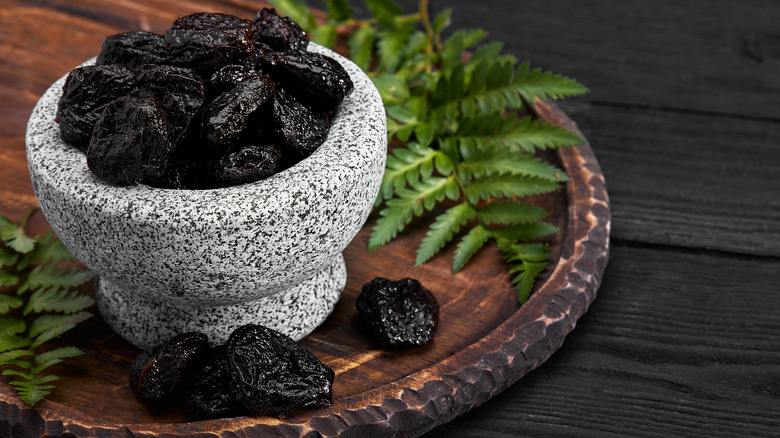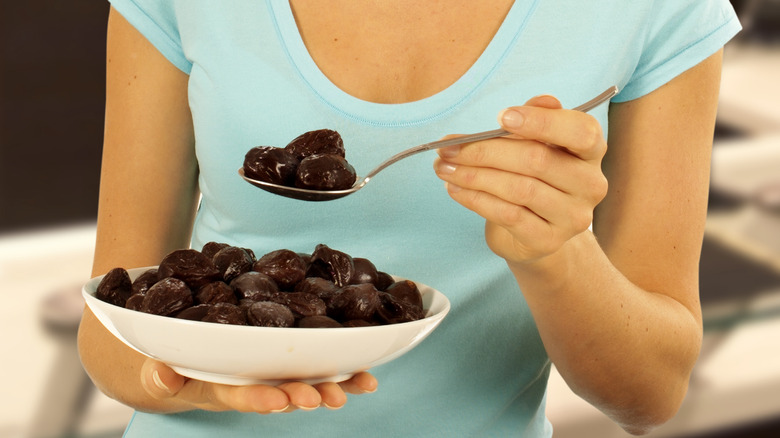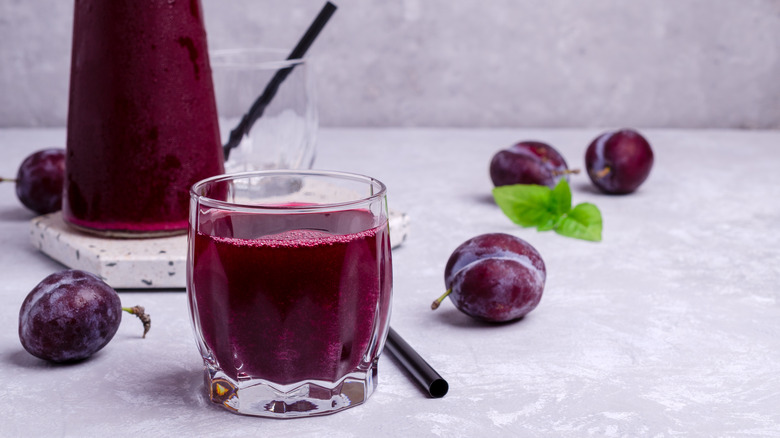Does Eating Prunes Really Help With Constipation?
Your grandmother was right when she told you to eat prunes for constipation. Rich in fiber and sorbitol, these dark-colored fruits support digestive health and can help you go number two (via WebMD). Plus, they have none of the negative side effects associated with laxatives. In one study, they were more effective than psyllium husk — another common dietary fiber — at improving stool frequency and consistency (per Alimentary Pharmacology and Therapeutics). Prunes, or dried plums, are also loaded with vitamins, minerals, and antioxidants. A serving of three prunes has only 72 calories and more than 2 grams of fiber, reports My Food Data. It also provides 5% of the recommended daily potassium intake and 15% of the daily recommended intake of vitamin K. Due to their high antioxidant content, these fruits may protect against heart disease and colon cancer (via the University of Guelph). And they're also an excellent source of phytochemicals. These important compounds are believed to help cells in the body fight off carcinogens and reduce your risk of developing cancer (per BreastCancer.org).
Prunes contain equal amounts of soluble and insoluble fiber
These fruits contain both soluble and insoluble fiber in equal amounts, explains Food and Nutrition Magazine. Soluble fiber absorbs water and forms a gel-like substance during digestion, adding bulk to the stool. At the same time, it increases satiety and slows sugar absorption into the bloodstream. This type of fiber may also help lower bad cholesterol levels and reduce heart disease risk (per Cleveland Clinic). Moreover, it can promote healthy gut bacteria for improved gut health.
Insoluble fiber, on the other hand, helps move food through the digestive tract. When consumed regularly, it may lower your risk of hemorrhoids and constipation. Both types of fiber can relieve bloating, heartburn, stomach pain, and symptoms of digestive distress, points out Food and Nutrition Magazine.
As a general rule, try not to exceed 25 grams of fiber per day if you're a woman or 38 grams per day if you're a man (per Cleveland Clinic). When consumed in excess, dietary fiber can reduce mineral absorption and cause digestive problems, such as gas and bloating, warn the experts at Duke University.
Sorbitol and other nutrients in prunes have mild laxative effects
Prunes also contain nearly 15 grams of sorbitol per 3 ounces, according to a 2001 report featured in Critical Reviews in Food Science and Nutrition. Sorbitol is a sugar alcohol with mild laxative effects. Dried plums are also a good source of neochlorogenic and chlorogenic acids, two types of phenolic acids, that may help relieve constipation.
Note, though — eating as little as 5 to 20 grams of sorbitol in one sitting may cause bloating, gas, and digestive discomfort, reports a 2019 review published in Canadian Family Physician. Doses higher than 20 grams can result in diarrhea. Registered dietician Colleen Sideck recommends eating no more than 10 to 12 prunes per day (via Food and Nutrition Magazine). Start with three or four fruits per day and gradually increase your consumption over several weeks to prevent diarrhea.
Prune juice contains these nutrients too, but in lower doses. Johns Hopkins Medicine suggests mixing 1 cup of prune juice, 1 cup of applesauce, and 1 cup of oat or wheat bran. Take 1 or 2 tablespoons each evening and then drink a cup of water to alleviate constipation. Increase the serving size to three or four tablespoons per day if you don't notice any changes after two weeks or so.


